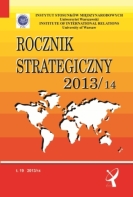Obszar WNP : imperium kontratakuje
The CIS region: The empire strikes back
Author(s): Andrzej Szeptycki, Marek MenkiszakSubject(s): Politics / Political Sciences
Published by: Wydawnictwo Naukowe Scholar Sp. z o.o.
Summary/Abstract: In the year 2013, the authoritarian model of government in Russia, based on a peculiarly understood conservative ideology, strengthened around Vladimir Putin’s leadership. Moreover, ethnic tensions in the Russian society gained momentum. The economy, despite a positive situation in the world energy market, stagnated, which shows that the current model of Russia’s economic development has outlived itself. Russia’s domestic weakness did not hamper its growing assertiveness in foreign policy, which brought some successes for Moscow. The main thrust of the policy was directed against the West, and the relations between Russia and the West were strained. March 2014 opened up a new chapter in Russia’s history. The Russian military aggression in Ukraine and the subsequent occupation and annexation of the Crimea has had far-reaching consequences in all fields. In domestic politics, it has become a tool for political mobilization of the Russian society under patriotic, anti-Western slogans, also directed against the liberal political opposition. In the economy, it has had an adverse effect on the already bad investment climate in Russia, and has contributed to a growing capital flight. In foreign policy, it has become a demonstration of the will to create a new Russian order in the post-Soviet area and in the whole North Eurasia, and a sign that Russia rejects the consequences of the end of the cold war. It has also brought about the largest crisis in the Russian-Western relations since the beginning of the 80s. The situation in Eastern Europe and South Caucasus was characterized by three main features: limited respect for human rights and fundamental freedoms, negative consequences of the global economic crisis, and the need to make a hard choice between association with the European Union and membership in the Russia-promoted Customs Union. Ukrainian authorities gave up signing the association agreement with the EU, which caused massive social protests known as “Euromaidan”, and ultimately led to the fall of Victor Yanukovych. In Belarus, problems with Russia led to unsuccessful attempts of rapprochement with the EU. In Moldova the pro-European government coalition collapsed, but the country initiated an association agreement with the European Union, like Georgia under the rule of the “Georgian Dream”. Armenia opted for the membership in the Customs Union, while Azerbaijan kept its independence vis-à-vis both Russia and the EU.
Journal: Rocznik Strategiczny
- Issue Year: 2013
- Issue No: 19
- Page Range: 217-248
- Page Count: 32
- Language: Polish

